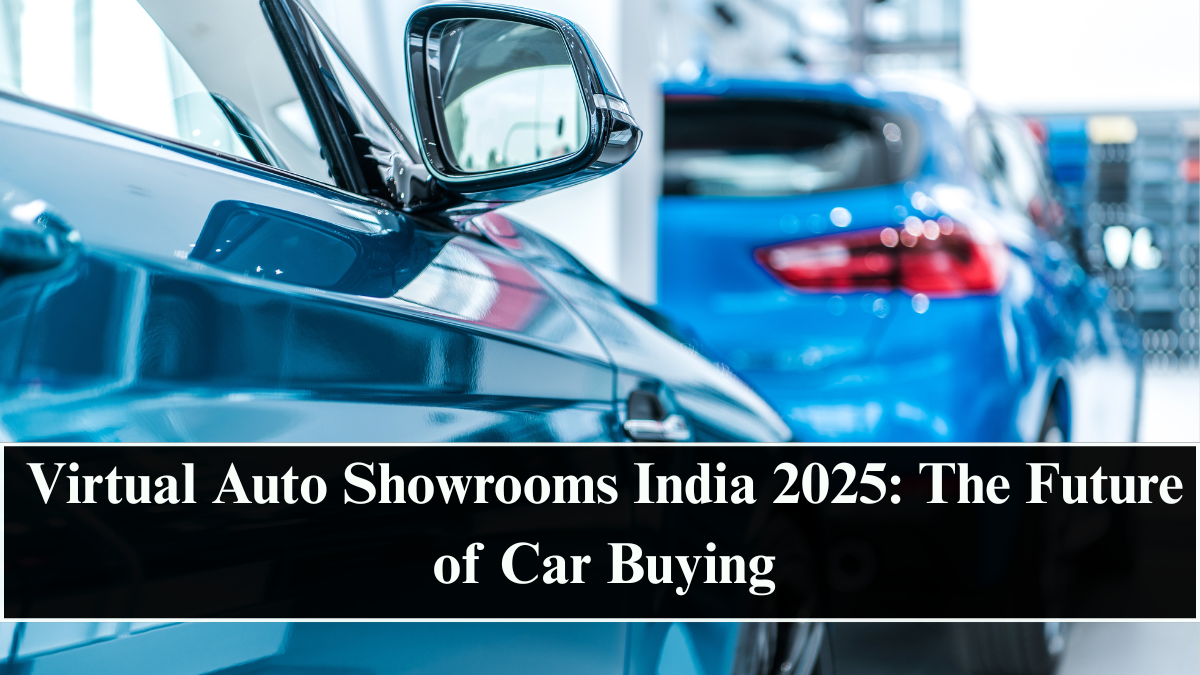The car-buying experience in India has gone fully digital. With Virtual Auto Showrooms India 2025, consumers no longer need to visit physical dealerships to explore vehicles. Immersive 3D environments, interactive configurators, and virtual reality (VR) test drives are redefining how Indians discover, compare, and purchase cars.
As the automotive sector embraces digital transformation, virtual showrooms are bridging the gap between technology and customer experience — combining convenience, transparency, and innovation to make car buying more personalized than ever before.

The Rise of Virtual Car Retail in India
In 2025, India’s automotive market is witnessing an unprecedented shift toward digitally enabled retail ecosystems. Accelerated by the pandemic and the rise of Gen Z buyers, online car sales now account for over 25% of total premium vehicle purchases in major cities.
Automakers like Tata Motors, Hyundai, Mahindra, and BMW India are leading this revolution with their own 3D interactive showrooms, accessible via web browsers, VR headsets, or mobile apps.
These platforms allow customers to:
-
View cars in 360-degree detail.
-
Change colors, interiors, and features in real time.
-
Compare models side by side.
-
Take virtual test drives through simulated environments.
-
Complete online financing, booking, and documentation without visiting a dealership.
How Virtual Showrooms Work
A virtual showroom replicates a dealership experience using 3D modeling, augmented reality (AR), and real-time rendering. Built on cloud and metaverse-based platforms, they enable customers to explore cars interactively from the comfort of their homes.
Here’s how the experience unfolds:
-
Users enter a virtual dealership through a browser or VR device.
-
They navigate through different car models using gesture or voice commands.
-
Real-time AR overlays display key specs, prices, and customization options.
-
Integrated AI chatbots and sales advisors answer queries or offer recommendations.
-
Users can even schedule at-home test drives through connected booking systems.
Why Automakers Are Investing in Virtual Retail
The shift to virtual showrooms offers multiple advantages for both automakers and consumers:
-
Lower Operational Costs: Reduces dependency on large physical dealership networks.
-
Wider Reach: Enables buyers from Tier-2 and Tier-3 cities to explore premium vehicles virtually.
-
Data-Driven Insights: AI tracks customer behavior to personalize offers and improve sales efficiency.
-
Sustainability: Minimizes physical infrastructure and printed materials, aligning with green business goals.
According to industry reports, automakers adopting digital-first sales strategies in India have seen conversion rates rise by 30% and customer engagement times double.
Integration with AR/VR and Metaverse Platforms
2025 marks the year when automotive retail meets the metaverse. Companies are leveraging AR/VR, haptic technology, and AI avatars to deliver hyper-realistic experiences that mimic real-world interactions.
For example:
-
Hyundai’s Virtual Studio lets users explore vehicles inside futuristic 3D environments.
-
BMW’s Joytopia platform integrates with the metaverse, offering guided tours and interactive storytelling.
-
Indian startups are building custom AR apps that allow users to project full-size 3D car models into their driveways using smartphones.
Virtual reality headsets such as Meta Quest and Apple Vision Pro are further enhancing realism, allowing customers to step inside vehicles, experience cabin acoustics, and interact with dashboard interfaces.
Future of Car Buying: Phygital Retail Experiences
The future of automotive retail lies in phygital integration — blending digital experiences with real-world convenience. Dealerships are evolving into experience centers, where customers can view, test, or finalize cars they first explored online.
Manufacturers are also integrating AI financing assistants, blockchain-based vehicle records, and instant verification tools to make the buying process seamless from start to finish.
In addition, EV brands are leveraging virtual showrooms to educate customers about charging networks, range analytics, and sustainable mobility benefits, boosting confidence in electric vehicle adoption.
The Road Ahead: India’s Virtual Mobility Marketplace
By 2025, India’s automotive retail ecosystem is evolving into a virtual mobility marketplace, where the car-buying journey happens entirely online — from discovery to delivery.
As AR, VR, and AI technologies mature, virtual showrooms will soon enable co-viewing with family members, AI-assisted negotiations, and real-time factory-to-customer customization.
The days of walking into a dealership are giving way to the age of digitally driven, immersive car ownership experiences — where buying your next car might be just a click (or a headset) away.
FAQs
What is a virtual auto showroom?
It’s a digital platform where customers can explore, customize, and purchase vehicles through immersive 3D and VR experiences.
Which automakers in India offer virtual showrooms?
Tata Motors, Hyundai, Mahindra, and BMW India are among the leading brands offering virtual car retail platforms.
Can buyers complete purchases online?
Yes. Virtual showrooms now support financing, booking, and documentation — enabling a complete digital transaction.
Do virtual showrooms require VR headsets?
No. Most platforms are accessible through web browsers or smartphones, though VR headsets enhance the immersive experience.
What’s the future of virtual car retail in India?
The industry is moving toward fully integrated phygital models that blend virtual exploration with real-world test drives and deliveries.
Click here to know more.
